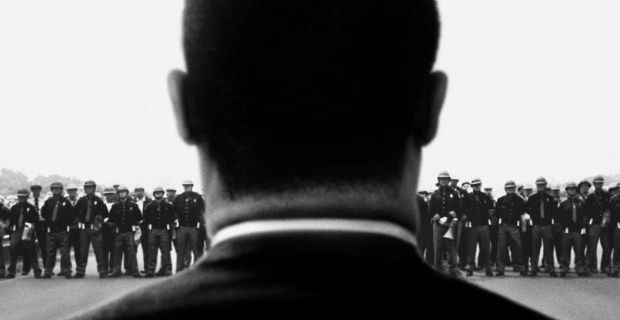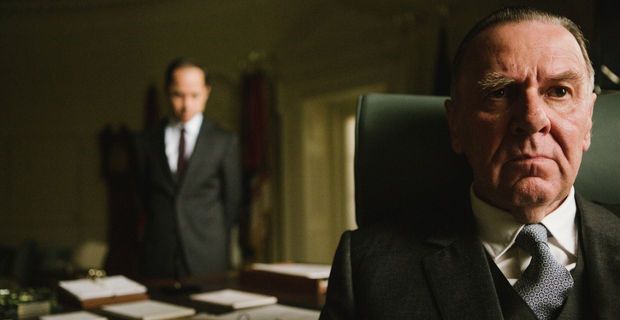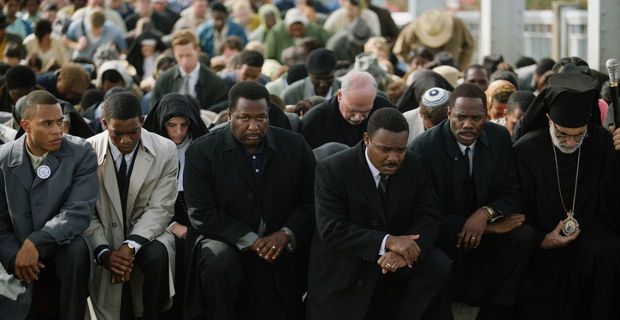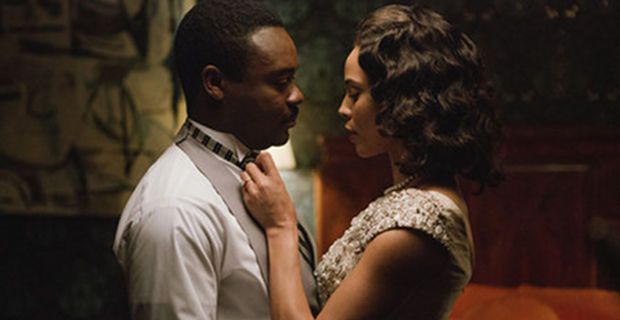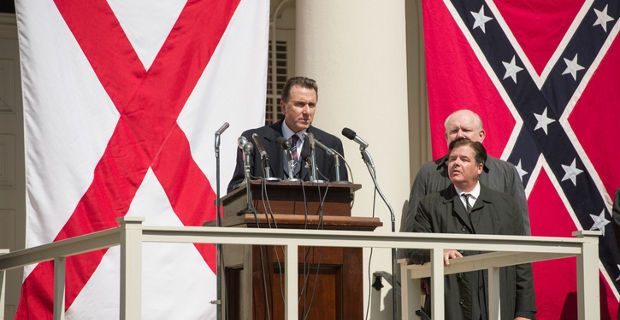Selma manages to beautifully articulate a pivotal moment in history - one that is hauntingly ironic in how it echoes our current times and society.
In Selma we look back at the 1965 campaign by Dr. Martin Luther King, Jr. (David Oyelowo) to secure equal voting rights for African-American citizens. That political battle was waged in the deep south, where King organized marches from the town of Selma to Montgomery, Alabama, in protest of President Lyndon B. Johnson's (Tom Wilkinson) hesitation on voting rights legislation.
Looking behind the curtain of history, we learn more about the political obstacles and negotiations King had to navigate in order to realize his agenda - including compromises within his own political, racial, and religious affiliations in order to achieve a greater good. Probing even deeper, we learn more about the toll that being an icon of Civil Rights took on Martin the man, his family and marriage.
Director Ava DuVernay (I Will Follow) and writer Paul Webb have taken on their biggest project by far (respectively), but rise to the challenge and deliver a great film. Despite being somewhat distant from its central character (and questioned on its accuracy), Selma manages to beautifully articulate a pivotal moment in history - one that is hauntingly ironic in how it echoes our current times and society.
The look of Selma is a faithful recreation of 1960's America, with impeccable production and costume design. On top of that, cinematographer Bradford Young (A Most Violent Year, Pariah) does an excellent job of mixing the grainy muted feel of '60s footage with a more vibrant color palette, creating a look that is both current yet very retro, and helps pull the viewer back into history. DuVernay also shows off an incredibly cinematic eye, creating (or recreating) moments of visual power and/or iconography that give the film Oscar-caliber impact and genuine emotional heft, in both understated and melodramatic fashion. In general, she shows off a range of good filmmaking technique (chiaroscuro, blocking, mis-en-scene, editing etc.).
Between DuVernay and Webb, the narrative of the film unfolds in a lean and purposed way, with no illusions about what the central focus is: the issue, rather than the iconic figures at the center of it (King and Johnson). That allows for a narrative flow which includes multiple side-stories and characters - and even though the film cannot possibly develop them all, it does a good job (on both page and screen) making them relevant to how the conflict (the voting rights act) is resolved.
Major scenes of development, action and tension are spliced nicely with riveting scenes of conversation, as well as quiet, reflective moments (mostly crafted by the director) in which we pierce the veil of history to get more intimate looks at King, his wife, Johnson or other figures involved in the issue. The only real drawback is that since the voting rights conflict is the primary concern of both director and writer, the multitude of characters introduced to us are given only fractional development and attention, making it hard to sometimes remember them all, or keep track of their respective arcs as the story goes along.
The same could be said about the central figures; despite a few key "behind the curtain" scenes, there is a bit of distance between the narrative and the inner workings of key players like Dr. King, his wife Coretta, Lyndon Johnson or Governor George Wallace. Still, the major chess pieces fit well into the cat-and-mouse game they are playing, and are interesting characters instead of historical imitations.
Indeed Selma is an achievement on an acting level, as well. Daivd Oyelowo (The Butler) steps into the role of Dr. Martin Luther King Jr. and really makes the iconic figure his own. Oyelowo's delivery and mannerisms carry traces of the Dr. King forever immortalized onscreen and in recordings, but is also separated enough from that image to foster a character who is new enough to allow for discovery and exploration. The same can be said for Carmen Ejogo (Purge: Anarchy) who makes her limited set of scenes all worthwhile by creating a version of Coretta Scott King who carries loads of implication and backstory in her poise and stare, without pulling the movie into being a relationship drama. In what limited capacity it can, Selma also gives a revealing (if fleeting) peek into what the Kings' marriage was all about, on both romantic and political levels.
Tom Wilkinson similarly creates a compelling version of Lyndon B. Johnson (questions of historical accuracy aside) - one who is not one-dimensionally evil, but rather a political operator equal to King, who happens to be pushing a different agenda. Whereas a lot of film's could've turned the King/Johnson relationship into a freedom fighter/oppressor morality tale, Selma chooses instead to take a more grounded and gray look at how political process, activism, media and faith were all entwined in the Selma marches - and in doing so manages to strike a loud chord of relevancy with our current days and times.
The supporting cast is made up of both famous faces and skilled character actors who all slip into effective roles in the film. Giovanni Ribisi (Ted), Dylan Baker (Spider-Man) and Tim Roth (Lie to Me) are all solid supports for Wilkinson as his top advisor, FBI head J. Edgar Hoover, and racist Alabama Governor George Wallace (respectively). Conversely, Wendell Pierce (Treme), Colman Domingo (The Butler) and Stephan James (When the Game Stands Tall) are a bit more dynamic and convincing as King's Civil Rights lieutenants, Rev. Hosea Williams, Ralph Abernathy and student activist John Lewis (respectively). In addition, famous faces like Oprah Winfrey and Common shed celebrity persona to play activists like Annie Lee Cooper and James Bevel, while up and comer Tessa Thompson (Dear White People) and actress Lorraine Toussaint (Orange Is The New Black) do a good (if quiet) job bringing student activist/freedom rider Diane Nash and King aid Amelia Boyton to life.
In the end, Selma is well-crafted political theater that is handled with enough insight and complexity to make it an important and relevant modern viewing experience. Even if you don't like biopics or intense melodrama, you will find that the film is cinematic and grounded enough to offer a great onscreen story worth engaging with. For students of history, the details of the story may be fertile ground for debate, but the message behind the story will be hard to argue with. In looking at the state of modern America, Dr. King's message about peaceful resistance and equal rights is more important than ever.
TRAILER
Selma is now playing in theaters in wide release. It is 128 minutes long and is Rated PG-13 for disturbing thematic material including violence, a suggestive moment, and brief strong language. Check Fandango for showing at your local theater.
Follow us @screenrant & @ppnkof

